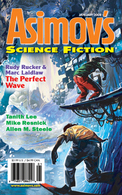
| Editor: | Sheila Williams |
| Issue: | Volume 32, No. 1 |
| ISSN: | 1065-2698 |
| Pages: | 144 |
This issue warrants a general grumble. There are a few fairly good stories, a better-than-average editorial, and a good retrospective column by Robert Silverberg, so I can't be too harsh with it. But far too much of the issue is eaten up by the Allen M. Steele book serialization and another Rudy Rucker short story. Even worse, the regular book review column was cut in favor of an index of the past year's issues. The book review column is my favorite non-fiction column (and better in Asimov's than F&SF) and something to look forward to at the end of the magazine. I would have rather seen Steele's long serialization trimmed a bit.
"The Perfect Wave" by Rudy Rucker & Marc Laidlaw: As those who have read my reviews for a while will know, I'm not the person to review this. Unlike some of the other stories Rucker has co-written with other people, this one felt thoroughly like a Rucker story, which means it's surrealistic, full of magic that claims to be somehow mathematical or technological, and weirdly superficially hippie in a stereotypically California way (which I've never encountered actually living in California). This story centers around a local pizza hangout, a surfing video game, and reality hacking through some unspecific mechanism. It's full of petty high-school rivalries and the sort of surfer culture you see in movies. I found it all rather annoying, but I'm not a Rucker fan. (4)
"Alastair Baffle's Emporium of Wonders" by Mike Resnick: Like a lot of Resnick's writing, this story is a bit sentimental, but it didn't take the obvious and expected ending. It's about two old men, lifetime friends and partners in all sorts of things, who first met in a mysterious magic store. As retirees living in a nursing home, they decide on a final adventure and try to find some trace of the store that meant so much to their childhood. As one might expect, they succeed in finding it, and from there the two men have different reactions nad follow different paths. I liked the ending; it avoids any obvious happy ending and tells a more complicated story about aging, belief, memories, and decisions. (7)
"The Whale's Lover" by Deborah Coates: This is more a mood piece than a plot-driven story. It follows a member of a crew hunting a giant whale in an alien ocean, but it's primarily about Tish's search for herself, for emotion, for some sense of closure with an alien creature said to be telepathic. The result is a bit metaphorical and confused, but some of the open-ocean imagery is haunting and beautiful. (6)
"The Beautiful and the Damned by F. Scott Fitzgerald" by Tanith Lee: The odd title sets the scene for a slow revelation of crisis, a story that follows several characters (very confusingly always from a first person perspective) through a city that's already doomed by a plague. The fun lies in working out what the plague is and how it works and then untangling the secret of one of the viewpoing characters. I found it hard to keep the narrative strands together — to be fair, I was somewhat distracted while reading it — but otherwise it's interesting and well-written. (6)
"Unlikely" by Will McIntosh: I got a kick out of this one. It's a great idea for a story: if two specific people, who don't otherwise know each other, spend time together, the accident rate in the city goes down. No one knows why, but it's statistically significant. It's a fun twist on chaos and the weird hidden patterns that one finds in statistics — an unrealistic pattern, to be sure, but when told from the perspective of one of the two people, it makes for a good story. Mingled in is fated partners and fated love and a contrarian streak that I quite liked. (7)
"Galaxy Blues, Part Three of Four" by Allen M. Steele: The serialization of Galaxy Blues continues. The crew has finally gotten to their destination and the plot, slowly, begins to take shape. Unfortunately, I just don't believe in Steele's aliens. They're far too human to be interesting and the main plot driver, for all that it takes place in a contact scenario, could have just as easily been written with human characters. None of the dangling threads of background seem to have much depth behind them, and I find the first-person narrator mostly annoying. The final part looks like it will have the real action, but it's taking a ridiculously long time to get there. (5)
Reviewed: 2008-02-18